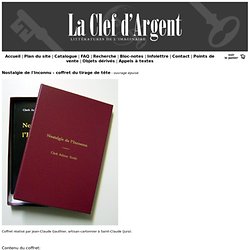

SMITH Clark Ashton : une page non officielle. La Clef d'Argent - Nostalgie de l'Inconnu (tirage de tête) Nostalgie de l'Inconnu - coffret du tirage de tête - ouvrage épuisé Coffret réalisé par Jean-Claude Gauthier, artisan-cartonnier à Saint-Claude (Jura).

Contenu du coffret: Les facsimilés décrits dans ce document ont été réalisés avec l'accord des propriétaires ou ayants-droit des documents originaux. Abonnez-nous à notre infolettre | Suivez-nous sur | Partagez cette page sur | Esperanto | English | Castellano | © 2014 La Clef d'Argent. Klarkash-Ton: Clark Ashton Smith (1893-1961) Clark Ashton Smith. The Shade of Klarkash-Ton. None strikes the note of cosmic horror as well as Clark Ashton Smith.

In sheer daemonic strangeness and fertility of conception, Smith is perhaps unexcelled by any other writer, living or dead. So wrote another great writer of cosmic horror, H.P. Lovecraft. Even given the Old Gent's tendency toward hyperbole when extolling the virtues of his colleagues, I find it hard to disagree, particularly on this, the 117th anniversary of Smith's birth in Long Valley, California.
As I've noted many times before, CAS is my personal favorite of the Weird Tales triumvirate and the one whose works I most wish I could emulate. That same elusiveness may also explain why Smith's direct influence on gaming is smaller than it ought to be. Saluting the Sorcerer. EDITOR’S NOTE: First published in 1963, “The Sorcerer Departs” was Donald Sidney-Fryer’s magisterial bio-critical essay on the work of poet and fictioneer Clark Ashton Smith.
Almost a half-century on, it remains the best. The full 17,000-word version, accompanied by new editorial matter, is currently available in a handsome booklet from Silver Key Press . On the occasion of the Bard of Auburn’s 117th birthday, and with the permission of Sidney-Fryer himself, The Cimmerian hereby presents a vastly truncated version of that essay to its readers, which we have titled “Saluting the Sorcerer.” It is our hope that the piece stimulates you to seek out Smith’s work — most of which is widely available in various in-print and out-of-print editions — as well as begin to delve into the prodigious poetry and critical writings of Donald Sidney-Fryer. The Sword-and-Sorcery Legacy of Clark Ashton Smith. Clark Ashton Smith gets credit for a lot of things, at least by those who are aware of his work. He was arguably the first poet to versify from a truly cosmic viewpoint when he wrote his legendary “ The Hashish-Eater .”
His poetry and prose, as well as his inimitable drawings, paintings and sculptures, captured the attention and respect of H.P. Lovecraft, who name-checked CAS in his own tales more than any writer, even Dunsany. Smith was a highly valued correspondent of Robert E. Howard . One thing that Clark Ashton Smith decidedly does not receive much credit for is being one of the founding fathers of the heroic fantasy genre. It would be hard to find anyone to dispute the fact that Robert E. In 1931, a little over two years after the publication of “The Shadow Kingdom” (and a solid year before the first Conan yarn ), Weird Tales published “The Tale of Satampra Zeiros” by Clark Ashton Smith.
I’m sorry. Emperor of Dreams: Remembering Clark Ashton Smith. There are some authors who can tell a new story, and yet make it feel as if it’s been told for eons. Something about the inherent truth within the work, combined with the sincere approach, has the tale feel like it was first told, albeit in an altered style, in Mesopotamian city-states, or Germanic campfires, or wattle huts in Africa. Neither allegorical, nor inextricably reflective of a period, the plot is essentially timeless. The details might change, but the story would remain. An example of this sort of story, for me, is Clark Ashton Smith’s “ The Empire of the Necromancers .”
For a short while after I discovered him, Clark Ashton Smith was my favourite author. I really, really need to get Stephen Jones a bottle of wine one of these days, since his anthologies and work on so many books has introduced me to a great many authors. In any case, it made a hell of a first impression: Smith loved words, and clearly took great delight in using all manner of eclectic vocabulary.